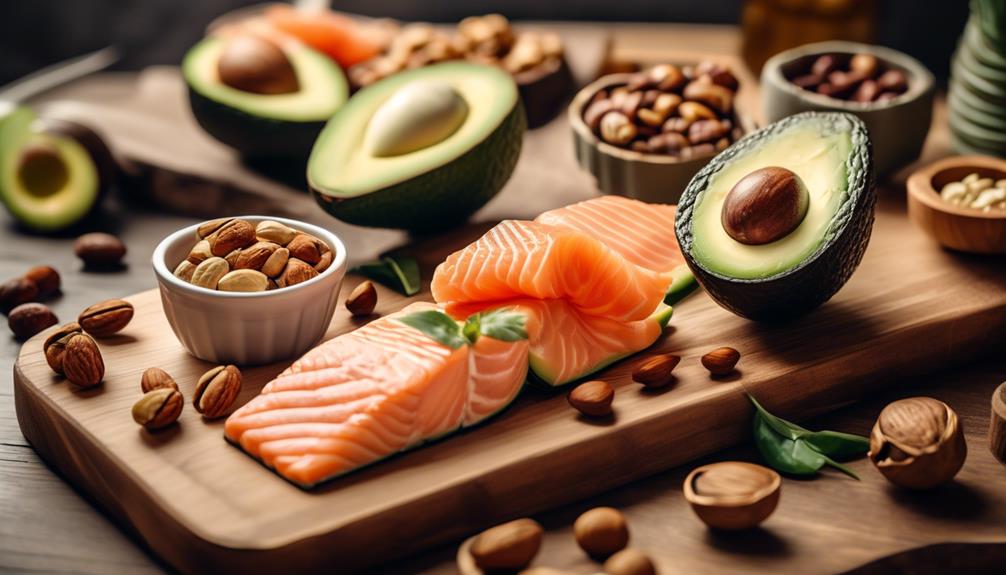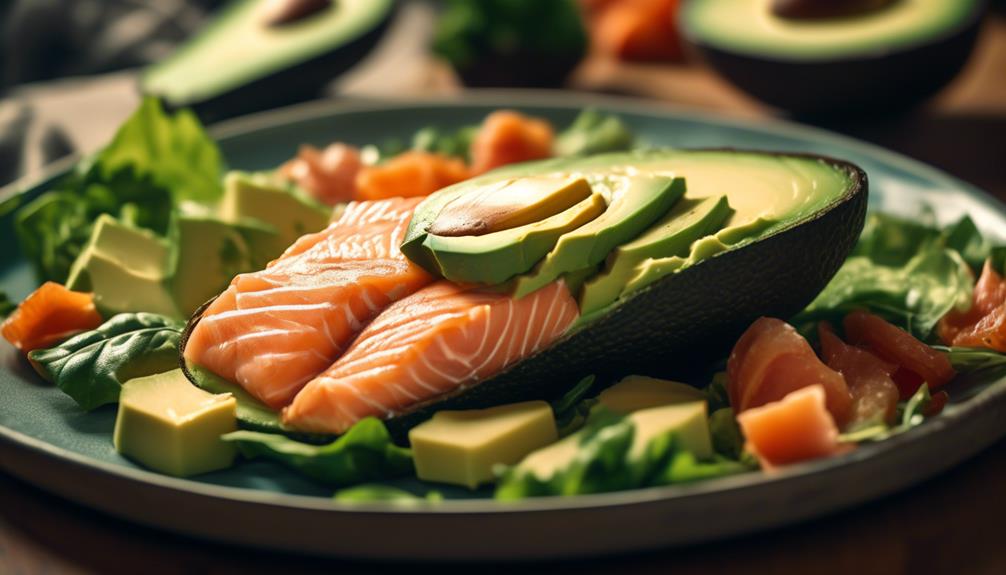Are you tired of feeling like a sluggish sloth, desperately in need of a boost of energy? Well, fear not, because I've got just the thing to get you buzzing like a bee on a warm summer day.
In this discussion, we'll dive into the world of effective keto strategies that will revitalize your body and help you power through your day with vigor. From incorporating healthy fats to optimizing protein consumption, there's a plethora of tips and tricks waiting for you.
So, fasten your seatbelts and get ready to discover the secrets of energizing your body on a ketogenic diet.
Incorporating Healthy Fats

To optimize your energy levels and support your body on a keto diet, incorporating healthy fats is essential. Healthy fat sources are an important component of the ketogenic lifestyle as they provide a concentrated source of energy and play a crucial role in achieving fat adaptation.
When it comes to healthy fat sources, there are several options to choose from. Avocados, for example, are a fantastic choice as they're rich in monounsaturated fats and also provide important nutrients like potassium and fiber. Another great option is nuts and seeds, which are packed with healthy fats, protein, and fiber. They make for a convenient and satisfying snack. Additionally, fatty fish like salmon and mackerel are excellent sources of omega-3 fatty acids, which have been shown to have numerous health benefits.
Incorporating these healthy fats into your meals and snacks can help support your body's energy needs while following a keto diet. It's important to note that fat adaptation is a process that takes time. Initially, your body may take some time to adjust to utilizing fats as its primary source of fuel. However, with consistency and patience, your body will become more efficient at burning fat for energy, leading to increased energy levels and improved overall health.
Boosting Electrolyte Intake
Boost your energy levels and enhance your body's performance on a keto diet by increasing your intake of essential electrolytes. Electrolytes are minerals that carry an electric charge and play a crucial role in maintaining proper hydration, nerve function, muscle contractions, and overall cell function. When following a low-carb, high-fat ketogenic diet, your body may experience an increased need for electrolytes due to reduced water retention.
Here are four ways to boost your electrolyte intake:
- Electrolyte Supplementation: Consider taking electrolyte supplements to ensure you're getting an adequate amount of minerals like sodium, potassium, magnesium, and calcium. These supplements can be easily incorporated into your daily routine and help replenish electrolytes lost through urine and sweat.
- Natural Sources: Include foods rich in electrolytes in your diet. Foods like avocados, leafy green vegetables, nuts, seeds, and seafood are excellent sources of potassium, magnesium, and calcium. Additionally, adding a pinch of sea salt to your meals can help increase your sodium intake.
- Hydration: Stay properly hydrated to maintain electrolyte balance. Drinking enough water throughout the day is important for the absorption and distribution of electrolytes in the body.
- Listen to Your Body: Pay attention to signs of electrolyte imbalance such as fatigue, muscle cramps, headaches, or irregular heartbeat. If you experience any of these symptoms, adjust your electrolyte intake accordingly.
Optimizing Protein Consumption

Maximize the benefits of your keto diet by strategically optimizing your protein consumption. Protein is a crucial macronutrient that plays a vital role in muscle recovery and maximizing gains. When following a keto diet, it's important to ensure that you're getting enough protein to support your body's needs.
To optimize protein consumption on a keto diet, focus on consuming high-quality sources of protein such as lean meats, poultry, fish, eggs, and dairy products. These foods aren't only rich in protein but also provide essential amino acids that are necessary for muscle repair and growth.
To calculate your protein needs, aim for around 0.6 to 1 gram of protein per pound of body weight per day. This will vary depending on your activity level, goals, and individual needs. It's always best to consult with a healthcare professional or registered dietitian to determine the appropriate amount of protein for your specific needs.
Spread out your protein intake throughout the day to optimize muscle protein synthesis. Aim for 20 to 30 grams of protein per meal to ensure your body has a steady supply of amino acids for muscle recovery and repair. Consider incorporating protein-rich snacks such as Greek yogurt, nuts, or protein shakes in between meals to meet your protein goals.
Practicing Intermittent Fasting
Intermittent fasting can offer numerous benefits when following a keto diet. By practicing intermittent fasting, you can help your body enter a state of ketosis more quickly and efficiently, leading to increased fat burning and weight loss.
Timing your eating windows strategically can also help regulate hunger, improve insulin sensitivity, and optimize energy levels throughout the day.
Fasting Benefits for Keto
Practicing intermittent fasting can provide numerous benefits for those following a keto diet, helping to enhance energy levels and support overall well-being. Here are four fasting advantages for keto:
- Increased fat burning: When you fast, your body depletes its glycogen stores and starts burning stored fat for energy. This can accelerate weight loss and boost ketone production, leading to deeper ketosis.
- Improved insulin sensitivity: Intermittent fasting can enhance insulin sensitivity, allowing your body to utilize glucose more effectively. This can help stabilize blood sugar levels and reduce the risk of insulin resistance and type 2 diabetes.
- Enhanced autophagy: Fasting triggers a process called autophagy, where your body breaks down damaged cells and proteins. This can support cellular repair and rejuvenation, promoting longevity and reducing the risk of chronic diseases.
- Mental clarity and focus: Fasting has been shown to improve cognitive function and mental clarity. By reducing inflammation and oxidative stress, fasting can enhance brain health and optimize cognitive performance.
Incorporating intermittent fasting into your keto lifestyle can provide you with these benefits and more, helping you achieve your health and wellness goals.
Timing Your Eating Windows
To effectively incorporate intermittent fasting into your keto lifestyle, it's important to carefully time your eating windows. Optimal meal timings can enhance your body's ability to burn fat for fuel and optimize your energy levels.
One popular approach is the 16/8 method, where you fast for 16 hours and have an 8-hour eating window. This allows your body to fully enter a fasted state, promoting ketosis and fat burning.
Another option is the 20/4 method, which involves a 20-hour fast with a 4-hour eating window. Extended fasting periods, such as 24-48 hours, can provide additional benefits by stimulating autophagy, a cellular cleaning process that removes damaged cells and promotes overall health.
Remember to listen to your body and adjust your eating windows based on your individual needs and preferences.
Prioritizing Quality Sleep

To prioritize quality sleep on a keto diet, there are a few key factors to consider.
First, practicing good sleep hygiene is essential. This means establishing a consistent sleep schedule, avoiding stimulating activities before bed, and creating a calm and relaxing bedtime routine.
Additionally, creating an optimal sleep environment can make a big difference. This includes keeping the bedroom cool, dark, and quiet, as well as investing in a comfortable mattress and pillows.
Sleep Hygiene Essentials
Quality sleep is crucial for optimizing your energy levels and overall well-being. To improve the quality of your sleep and wake up feeling refreshed, consider the following sleep hygiene essentials:
- Stick to a consistent sleep schedule: Going to bed and waking up at the same time every day helps regulate your body's internal clock, promoting better sleep.
- Create a bedtime routine: Engaging in relaxing activities before bed, such as reading a book or practicing deep breathing exercises, signals to your body that it's time to wind down.
- Make your sleep environment conducive to rest: Keep your bedroom cool, dark, and quiet to create an ideal sleep environment.
- Limit exposure to screens before bed: The blue light emitted by electronic devices can interfere with your sleep. Avoid using screens for at least an hour before bedtime.
Optimal Sleep Environment
Creating an optimal sleep environment is essential for prioritizing quality sleep and enhancing your overall well-being. One key factor in achieving this is ensuring that you have a comfortable and supportive mattress. An old or uncomfortable mattress can lead to disrupted sleep and discomfort throughout the night. Consider investing in a high-quality mattress that provides the right level of firmness and support for your body.
Additionally, reducing screen time before bed can significantly improve your sleep quality. The blue light emitted by electronic devices can suppress the production of melatonin, a hormone that regulates sleep. Make it a habit to avoid screens at least an hour before bed, and instead, engage in relaxing activities such as reading or taking a warm bath.
Staying Hydrated
Staying hydrated is essential for optimizing your body's energy levels on a keto diet. Adequate hydration provides numerous benefits that can help you feel more energized throughout the day. Here are four reasons why staying hydrated is crucial for your keto journey:
- Improved Physical Performance: Proper hydration ensures that your muscles and joints are well lubricated, allowing for better physical performance during workouts. When you're well-hydrated, you can push harder and longer, maximizing the benefits of your exercise routine.
- Enhanced Cognitive Function: Dehydration can negatively impact your brain function, leading to fatigue, decreased focus, and impaired decision-making. By maintaining optimal water intake, you can support your cognitive abilities, stay mentally sharp, and improve your overall productivity.
- Boosted Metabolism: Studies have shown that drinking water can temporarily increase your metabolic rate, aiding in weight management. Keeping your body hydrated helps optimize your metabolism and supports the efficient breakdown of fats, which is especially important when following a keto diet.
- Increased Energy Levels: Dehydration can cause feelings of fatigue and low energy. By staying properly hydrated, you can combat these symptoms and maintain consistent energy levels throughout the day, allowing you to tackle your daily activities with vigor.
To stay hydrated on a keto diet, aim to drink at least 8 cups (64 ounces) of water per day. Additionally, listen to your body's cues for thirst and consume electrolytes to replenish minerals lost through increased urination. Remember, proper hydration is a simple yet powerful strategy to optimize your energy levels on your keto journey.
Conclusion
In conclusion, by incorporating healthy fats, boosting electrolyte intake, optimizing protein consumption, practicing intermittent fasting, prioritizing quality sleep, and staying hydrated, you can effectively energize your body on a keto diet.
Think of your body as a well-oiled machine that runs on these strategies, providing you with the energy you need to conquer your day.
So, fuel yourself with the right nutrients and embrace the power of keto for a vibrant and energized life.







